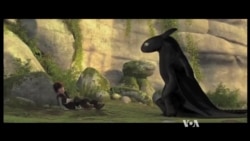Animated films are constantly reaching new heights in technical innovation and depth of narrative.
One of them, How to Train your Dragon 2, surpasses filmmaker Dean Deblois' blockbuster first installment from four years ago.
Deblois tells VOA the sky is the limit in the evolution of digital animation.
In 2010, we watched a Viking teenager named Hiccup catching and bonding with a dragon he named Toothless. The bittersweet 3D film became an instant hit. Four years later, How to Train your Dragon 2, pits Hiccup and Toothless against an evil dragon lord.
The sequel is also in 3D, but DeBlois says, there has been a huge technological leap -- in clarity, colors and details -- from his original.
“Things like water, clouds and ice and everything else that used to be a real challenge, looks fantastic now," DeBlois said. "So, I wonder in 10 years from now, if How to Train Your Dragon 2, will look primitive.”
That's what animators might have wondered back in 1937, when Walt Disney Studios rolled out its cutting-edge fairy tale Snow White and the Seven Dwarfs. Each frame of the Technicolor film was hand drawn.
Fast forward 80 years, and Disney’s movie Frozen channels our inner princess through empowered Queen Elsa in a picture-perfect digital world.
Digital animation has also influenced the video game industry. The Last of Us, a mature game of survival in a zombie-infested world uses the latest in motion capture technology, where real actors’ performances are transformed into a digital avatar.
However, filmmaker DeBlois feels the hyper-realistic motion capture technology lacks the liveliness animators infuse into their hand-drawn characters.
“Because they make a living out of studying human expression and movement and they add a little caricature to it so that it becomes more real than reality," he said. "It comes with great experience and great talent but a simple motion capture doesn’t really capture that yet.”
And though an impressive 3D digital animation draws the crowds in the theater, DeBlois says it is the tone and complexity of the story that keep fans interested in the genre.
“Animated films have a real power to them," he said. "But I am kind of on a personal crusade to lift the stigma that is often put upon them where adults feel almost embarrassed to go to an animated movie or [feel] that there won’t be anything for them.”
DeBlois says animated movies are no longer just for kids. Their unpredictable storylines offer gravitas to digital animation and digital animation provides realism to extraordinary fantasies.
One of them, How to Train your Dragon 2, surpasses filmmaker Dean Deblois' blockbuster first installment from four years ago.
Deblois tells VOA the sky is the limit in the evolution of digital animation.
In 2010, we watched a Viking teenager named Hiccup catching and bonding with a dragon he named Toothless. The bittersweet 3D film became an instant hit. Four years later, How to Train your Dragon 2, pits Hiccup and Toothless against an evil dragon lord.
The sequel is also in 3D, but DeBlois says, there has been a huge technological leap -- in clarity, colors and details -- from his original.
“Things like water, clouds and ice and everything else that used to be a real challenge, looks fantastic now," DeBlois said. "So, I wonder in 10 years from now, if How to Train Your Dragon 2, will look primitive.”
That's what animators might have wondered back in 1937, when Walt Disney Studios rolled out its cutting-edge fairy tale Snow White and the Seven Dwarfs. Each frame of the Technicolor film was hand drawn.
Fast forward 80 years, and Disney’s movie Frozen channels our inner princess through empowered Queen Elsa in a picture-perfect digital world.
Digital animation has also influenced the video game industry. The Last of Us, a mature game of survival in a zombie-infested world uses the latest in motion capture technology, where real actors’ performances are transformed into a digital avatar.
However, filmmaker DeBlois feels the hyper-realistic motion capture technology lacks the liveliness animators infuse into their hand-drawn characters.
“Because they make a living out of studying human expression and movement and they add a little caricature to it so that it becomes more real than reality," he said. "It comes with great experience and great talent but a simple motion capture doesn’t really capture that yet.”
And though an impressive 3D digital animation draws the crowds in the theater, DeBlois says it is the tone and complexity of the story that keep fans interested in the genre.
“Animated films have a real power to them," he said. "But I am kind of on a personal crusade to lift the stigma that is often put upon them where adults feel almost embarrassed to go to an animated movie or [feel] that there won’t be anything for them.”
DeBlois says animated movies are no longer just for kids. Their unpredictable storylines offer gravitas to digital animation and digital animation provides realism to extraordinary fantasies.





